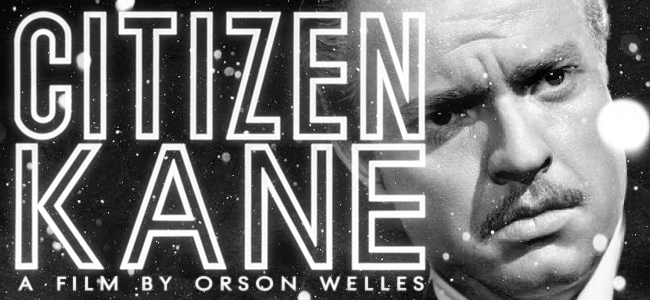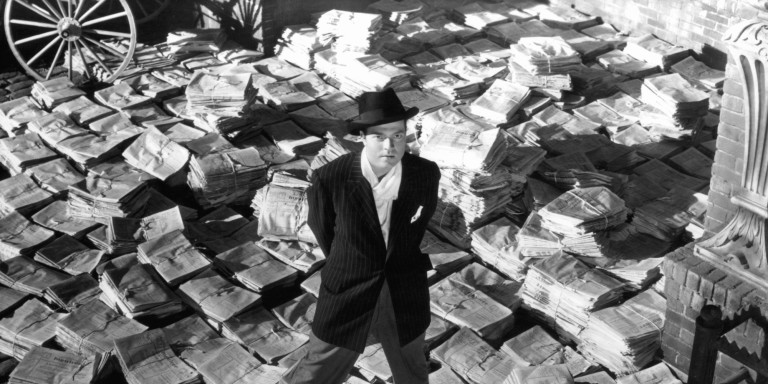I think an introductory word is fitting. I wish that I could take credit for thinking up this new feature to my blog but unfortunately I can’t. This was the brainchild of one of my close friends who suggested that in the spirit of #ThrowbackThursday I should review classic films every Thursday. Now being a great idea, I wanted to incorporate it into my blog as soon as possible; but with me being a pathological procrastinator it took me several months to actually implement it. I was also a bit hesitant to implement this feature because it would mean a steady commitment and those can be difficult to honour when the other aspects of life get in the way of blogging. But I decided to take the leap and you can look forward to what will hopefully be a constant stream of reviews of classic movies every Thursday.
With no further adieu, let’s begin…
So I watched Citizen Kane…

Once again I wish I could say choosing this movie for the first classic review was my choice but that credit also belongs to my friend. It’s a fine choice, there certainly aren’t many movies which are as well-known or as highly rated as this one. It’s the gold standard of film. I’ve even heard it being described as the best film that ever was or ever will be. This was actually my first time watching this film and – my goodness – never have the critics been more right!
Citizen Kane tells the story of Charles Foster Kane – an ultra wealthy newspaper tycoon who dies (of old age) in the beginning of the movie. His last words were ‘Rosebud’ – an enigma that no one seems to be able to explain the meaning of. A newspaper editor assigns one of his reporters to interview various people who were close to Kane in order to try to decipher the mysterious message. This leads to a description of Kane’s life from various perspectives including those of his former wife, business partners and even employees.

One of the reasons I love watching classic movies is that they often provide you with a greater understanding of modern cinema and pop culture. A truly great piece of work doesn’t only achieve greatness in the limits of itself but also in its influence on the works of others. Its lustre circulates, trickling down to the works of others; inspiring them to prestige or (more commonly) mimicry. There were sections of this film that I’ve seen replicated (but never reproduced) in other films. I believe that’s where a classic film’s eminence truly lies, not only in the film itself but in its influence across genres and generations.
Researching this film shed even more light on how remarkable it is. This film was a wonderful example of pioneering in cinema. The elements that make this film the classic it is, had never been used before – at least not in Hollywood. Elements such as the use of multiple narrators; extensive flashbacks; sets that were designed with actual ceilings which allowed for more daring camera angles. Citizen Kane did these things first. This makes the film all the more impressive because of the innovations it created.
I haven’t even begun to praise this film’s engrossing script. This film is a quasi-autobiography and the problem that autobiographies often have is a script that lacks focus. Autobiographies feel compelled to show us everything in an attempt to provide insight towards a character and this often leads to us being given more than we need. Citizen Kane doesn’t make this mistake at all. The film depicts a vast period of time but still manages to maintain a concise and tightly-focused narrative. You’re given the highlights and pivotal moments of Kane’s life. There are no gratuitous or superfluous, unnecessary moments. Kane’s story arc is one of the best examples of character development I’ve ever seen. He starts out an idealist but ends up becoming the very cynic he fought against in his youth. The transformation in his character is subtle and handled with real care and precision. You almost don’t realise that he’s changing but when you do notice it, it makes perfect sense.

Another great element of this film is its make-up work. The film follows Kane’s life from childhood to death with Orson Welles starring as the titular Kane, for the majority of the film. It’s amazing seeing how the characters age right in front of your eyes. The kind of make-up used in this movie was yet another innovation. It boggles the mind how a movie made in the 1940’s is able to create better visuals than modern day movies that have the technology to create any image. This is a wonderful example of the craft necessary to create a timeless classic.
Earlier I mentioned how true classics embed themselves in pop-culture even decades after their release. I solved the mystery of this movie – the meaning of ‘Rosebud’ – pretty early on, not because I read up on the movie or I’m psychic; but because the reference was present in a cartoon that I used to watch in my pre-adolescent years. A cartoon that was made over half a century after this film’s release – that’s staying power. I don’t want to spoil it but if you ever watched Fat Dog Mandoza, you’ll figure it out too.
Lastly, I have to praise Orson Welles. All the actors in this movie are superb but this was his baby – he wrote it, fought for it to be made, directed it, starred in it AND he was a first time director! There were moments in the movie where I had to stop and admire the camera angles. I’ve never seen a movie so deliberate with its camera angles. Now camera angles may seem trivial but the subliminal subtext they provide to an audience cannot be discounted. This film is one where every structure, every element required to produce quality, functions at the highest level. No detail is overlooked and because of this , there are no flaws or chinks in the armour that you can poke at. This is a perfect film.



This feature is a good idea. I look forward to seeing what else you pick.
LikeLike
One of the great all-time classics for sure. Great review. Glad you liked it.
LikeLike
So happy you love this movie. It is a spectacular film that, you’re right, came up with so many cinematic innovations it’s ridiculous. And those camera angles. Wow. Like you said, each of them served a purpose. And served it perfectly. Welles was a genius.
LikeLike